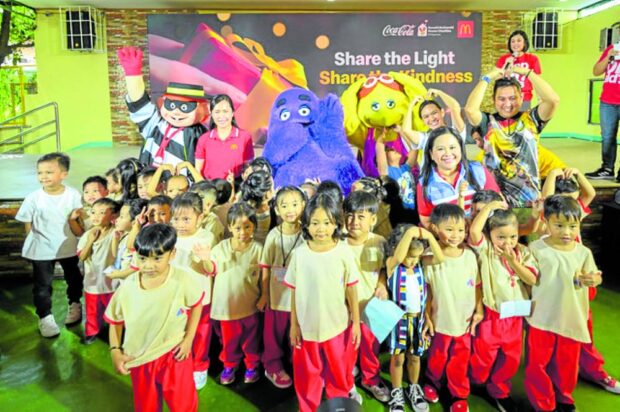
HOLIDAY CHEER The kids of Bahay Bulilit with McDonald’s mascots and volunteers on Dec. 9 at Ronald McDonald Bahay Bulilit Learning Center —Contributed photo
The festive season in the Philippines is synonymous with overflowing plates of food, joyous family reunions and a spirit of generosity that warms even the coldest hearts. This year, McDonald’s Philippines and Coca-Cola are adding another dimension to the holiday cheer with their annual “Share the Light” initiative.
The event recently took place at the Bahay Bulilit Learning Center in Matandang Balara, Quezon City, where around 100 families, comprising around 400 individuals, actively participated. Majority of them were children within the age of 3 to 5 years, highlighting the program’s focus on nurturing and educating the younger members of the community.
Adi Hernandez, assistant vice president for corporate communications at McDonald’s Philippines, shares with the Inquirer the fast-food chain’s commitment to give back, highlighting Bahay Bulilit as a tangible example of successful collaboration between the private sector and government units.
Hernandez underscores McDonald’s Philippines’ corporate social responsibility thrust, focusing on empowering youth and education.
Bahay Bulilit serves as a safe space for children to play and learn while their parents work. Accredited social workers and community volunteers lead lessons and activities, creating a supportive environment for the children’s cognitive, social and emotional development.
Equipped with ‘Ronald McDonald Read to Learn’ kits, featuring large illustrated books and activity workbooks, Bahay Bulilit offers a well-rounded learning experience. Its holistic educational approach, integrating play into the learning process, is seen to establish a strong foundation for the children’s future academic achievements and personal growth.
There are currently 39 Bahay Bulilit centers nationwide, mostly situated in underserved and low-income communities. Hernandez says that they are currently working to scale the initiative sustainably in the near future. The barangays around Bahay Bulilit are not just the areas where McDonald’s serves and helps out. “Where we have a store [in a community], we help,” says Hernandez. She recalls that even in Marawi City, Ronald Mcdonald House Charities had helped out even if they don’t have any store there.As part of the “Share the Light” initiative, an additional event in Cebu on Dec. 19 in Cebu brought joy to 300 more families. The goal is for McDonald’s to give away 1.5 million Happy Meal toys nationwide.
“At McDonald’s, we strive to create positive impact in the lives of Filipinos—customers, partners, and families alike. Partnering with Coca-Cola allows us to extend goodwill and share feel-good moments with Filipino families through our food,” says Kenneth Yang, CEO and president of McDonald’s Philippines.
Beyond the holidays
Hernandez shares that the fast-food chain supports not just the young children but also those studying in college by providing part-time job opportunities.
“We do not practice contractualization in all our stores,” says Hernandez. Every employee of the fast-food chain receives apt regular employee benefits. During the pandemic, Hernandez recalls that McDonald’s transformed storefronts into areas for online learning. These have now evolved into McDonald’s night classrooms. The fast-food chain now opens its doors during the night to 60 participating stores near key universities in Metro Manila for students’ late-night study sessions.
Hernandez also shares the group’s commitment to sustainability, including initiatives such as phasing out single-use plastics and the Green and Good stores, which have rainwater harvesting tanks, inverter air-conditioning technology and LED lights. Along with their use of strawless lids, all of these initiatives have collectively reduced plastic waste by 273 metric tons.
“Beyond the holidays, our goal is to share the light we experience not only during this season but every day. Through RMGC McDonald’s Kindness Kitchen, we serve warm meals to communities in need,” says Yang.
The Kindness Kitchen endeavors to provide meals to various groups, including communities affected by natural calamities, medical health workers and front-line personnel such as police officers, local government volunteers and government agencies. Additionally, the program extends assistance to marginalized sectors facing food insecurity. Since its inception in 2020, the project has successfully delivered more than 570,000 meals.